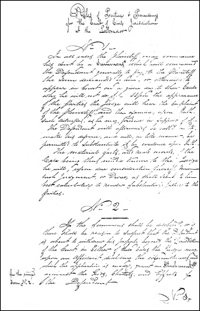Down North on the Labrador Circuit:
The Court of Civil Jurisdiction 1826 to 1833
by Nina Jane Goudie
The Legal System in Labrador
The Act stated that the Supreme Court had jurisdiction in all civil and criminal matters “in Newfoundland and in all lands, islands and territories dependent upon the Government thereof.” 52 Labrador as a part of Newfoundland is referenced separately in Section 18. It enabled the Governor to institute a Court of Civil Jurisdiction on the Coast of Labrador. Section 18 provided: 52 Labrador as a part of Newfoundland is referenced separately in Section 18. It enabled the Governor to institute a Court of Civil Jurisdiction on the Coast of Labrador. Section 18 provided:
... and it shall be lawful for the Governor or acting Governor of Newfoundland, for the time being, to institute a Court of Civil Jurisdiction at any such parts or places on the coast of Labrador or the islands adjacent thereto...as occasion may require; and such Courts shall be held by one Judge and shall be a Court of Record, and shall have jurisdiction, power and authority to hear and determine all suits and complaints of a civil nature arising within any of the said parts and places on the coast of Labrador... and the said Court shall be holden by a Judge who shall be appointed from time to time by the Governor or acting Governor of Newfoundland and shall have a clerk and such other ministerial officers as the Governor or acting Governor shall appoint; and the proceedings of the said Court shall be summary, and such forms of process and such rules of practice and proceedings as shall be settled by the Chief judge of the said Supreme Court, shall be followed by the said Court and no other.53
It is interesting that reference to Labrador was limited to one section of the Act rather than inclusive from the beginning. Perhaps in the minds of British policymakers Newfoundland's jurisdiction over Labrador remained tenuous. Limiting Labrador to one section made it simple to repeal, should jurisdiction over Labrador be changed once again.
The Colonial Office records show that following passage of the Act of 1824, preparations were made for the institution of the new system of judicature. A positive mood was evident as local officials moved toward implementing the new system. “It (the Act of 1824) gives the country all the advantages of the unrivalled jurisprudence of England.” 54 Correspondences include letters from applicants vying for court positions, letters of recommendation, discussions on matters of process and letters of commission.55 There are several references to Labrador. An annual salary of £700 was reserved for the judge of the Labrador Court — the same salary that would be paid to the puisne judges of the Supreme Court in St. John's. He was also “permitted to occupy any unappropriated public building for [his] residence without paying rent.” But Governor Cochrane noted that unfortunately “there were not any such buildings in the colony.” 54 Correspondences include letters from applicants vying for court positions, letters of recommendation, discussions on matters of process and letters of commission.55 There are several references to Labrador. An annual salary of £700 was reserved for the judge of the Labrador Court — the same salary that would be paid to the puisne judges of the Supreme Court in St. John's. He was also “permitted to occupy any unappropriated public building for [his] residence without paying rent.” But Governor Cochrane noted that unfortunately “there were not any such buildings in the colony.” 56 The educational requirement for judges apparently did not apply to the judge on the Labrador Court, as the Royal Navy's Captain William Paterson was appointed Judge in June 1825.57 However, it was a seasonal task. When not in Labrador, Paterson assumed administrative duties in St. John's. He was a member of the Executive Council from 1828 to 1831. 56 The educational requirement for judges apparently did not apply to the judge on the Labrador Court, as the Royal Navy's Captain William Paterson was appointed Judge in June 1825.57 However, it was a seasonal task. When not in Labrador, Paterson assumed administrative duties in St. John's. He was a member of the Executive Council from 1828 to 1831.
Rules of Practice and Proceedings
From Blaikie, James and Simms, George, Records of the Court of Civil Jurisdiction, Labrador, 1826-1833, Provincial Archives of Newfoundland and labrador (PANL), GN5/5/G/1.
 with more information (280 kb). with more information (280 kb).
|

|
|



